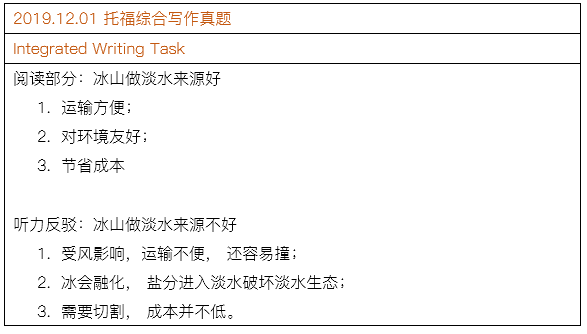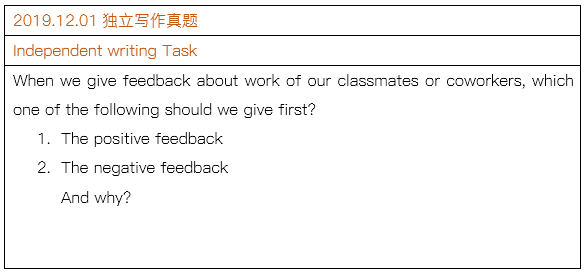

本期考题考察的话题属于托福综合写作中占比稍低的资源能源类话题, 讨论的是冰山做淡水来源是否好。一方面,TPO中有比较贴近的资源能源类考题可以作为练习材料。另一方面,本期考题阅读听力材料的部分分论点角度与2018年9月8日工程类真题相近, 都是围绕某一举措是否有益进行讨论, 并且都涉及成本和环境两个因素, 所以本期考题也可视作工程与自然资源话题的结合考察。往年工程类话题考察频率不高,考生可能不熟悉这类话题, 而本期综合写作考题作为工程与自然资源能源的结合,则可以为考生熟悉工程类话题提供参考。
自然资源能源类TPO20
阅读部分:用于应对美国黄石公园森林火灾的“let it burn”策略应该被“extinguishing forest fire”策略取代
1. 黄石公园火灾给公园里的植物造成巨大伤害, 植物被烧焦。
2. 公园里的野生生物受到影响: 小物种可能无法逃离火海, 栖息地可能被破坏, 食物链可能被打乱。
3. 火灾导致旅游旺季缩短, 游客减少, 给当地经济造成消极影响。
听力反驳:“let it burn”策略很好
1. 自然森林火灾中被烧毁的地带为一些新植物创造生长机会, 使植被更多样。例如被大火烧毁的地带为一些小植物提供开阔而荫蔽的空间;又比如, 有些特定植物的种子只有在高温环境才能发芽。
2. 那些在火灾之后取代原有树木的小型植物给一些小型动物提供的栖息地,比如兔子。同样地,以兔子为猎物的动物也能茁壮成长。 因而食物链变得更强大。
3. 森林火灾若每年发生, 才会对旅游业造成不良影响;然而1988年的森林火灾是很多不寻常的因素恰巧同时发生, 才导致了自然森林火灾,而且自此之后, 黄石公园并未再发生过这样的火灾。
自然资源能源类
阅读部分:乙醇燃料替代汽油没有什么优势。
1. 乙醇燃料无法改善汽油带来的的环境问题:全球变暖问题,因为它燃烧也会释放二氧化碳这种温室气体。
2. 大量地生产乙醇会导致其他需要消耗植物的行业缺乏可用的植物,比如鸡、牛养殖业。
3. 乙醇燃料在价格上不如汽油有优势, 尽管目前二者价格差不多, 但这是因为政府补助,如果政府停止补助,乙醇燃料价格会迅速上涨
听力反驳:乙醇燃料是一个很好的替代品,阅读中说到的问题不可信。
1. 乙醇燃料不会加剧全球变暖。 乙醇是用植物制作的, 植物的生长能够抵消一部分乙醇燃烧产生的二氧化碳
2. 乙醇的大规模生产不一定会减少养殖业所需的植物, 因为可以使用动物不可食用的部分去制作乙醇燃料。
3. 政府资助不是必要的, 一旦使用乙醇燃料的消费者增多, 生产者会增加产量, 最终带来价格下调
工程类真题20180908 CN
阅读部分:在美国西海岸修建高铁有利
1. 省钱, 维修普通道路贵
2. 减少交通堵塞
3. 对环境友好
听力反驳:在美国西海岸修高铁不利
1. 建铁轨系统花费更多
2. 还是要取决于各地居民用哪种交通工具更方便, 东边的坐高铁快, 西边的开车快
3. 降速之后不环保

题目解析:
12月1日独立写作是二选一题型, 我们的立场,要么是支持先给正面反馈, 再给负面反馈; 要么相反。
若选择前者作为立场,我们大致可以从两个角度思考: ,先给正面反馈有哪些优点,后给负面反馈有哪些优点; 第二, 先给负面反馈有哪些缺点, 后给正面反馈有哪些缺点。依据这个思路, 我们可以得出三个分论点如下: 1. 正面反馈能起到缓冲作用,使得负面反馈更容易被接受; 2. 先给正面反馈,显得更加友好体贴, 有利于维护与他人的关系;3. 后给负面反馈, 负面反馈中的建设性意见更容易被记住。
若选择后者作为立场,类似地,我们大致可以从两个角度构思分论点: ,先给负面反馈有哪些优点,后给正面反馈有哪些优点; 第二, 先给正面反馈有哪些缺点, 后给负面反馈哪些缺点。依据这个思路, 我们可以得到的分论点如下: 1. 先说负面反馈,开门见山, 直指问题; 2. 先说负面反馈, 有大量时间可以用来讨论解决问题; 3, 先给正面反馈, 然后转折说负面反馈, 显得正面反馈很虚假, 没诚意。本篇范文采取种写法。
请参考如下范文:
In contemporary society, giving feedback plays a key role in breakthrough. Some people prefer to present positive feedback first, while others contends that starting with negative feedback is more beneficial. From my perspective, positive feedback should be delivered before negative feedback.
Initially, recipients are more likely to accept negative feedback after hearing positive remark. Conveying approvals of behavior, attitude or performance, positive feedback motivates recipients and boosts their confident. With such uplifting comments serving as a cushion and softening the blow, the upcoming negative feedback may seem less straight and harsh, and thus are more acceptable for recipients. For instance, one of my coworkers once expressed her opinion about my work by starting with compliment on my contribution. Then she criticized my low working efficiency which I acknowledged immediately. Had she not recognized my hard work first, I would feel irritated when hearing her criticism and be reluctant to admit my problem. Therefore, recipients would be more open with negative feedback that follows positive feedback.
Furthermore, beginning with positive feedback benefits your interpersonal relationship with classmates or coworkers. For some people, it somehow seems mean to initiate an conversation by focusing on the negative since it makes them feel their merits are not appreciated or ignored. Consequently, you and your fellows might gradually drift apart due to your inconsiderate and straightforward comment. In contrast, given that positive feedback is warm and inspiring, you leave your peers an impression of being caring and considerate, thus your relationship with them can be maintained.
Finally, negative feedback delivered at the end is more likely to be remembered by recipient. Admittedly, leading with negative feedback goes straightforward to the areas where your classmates or coworkers need to improve. However, it overlooks the fact that people typically focus on the last thing they hear in a sequence, so they are left remembering the positive comment rather than the critique. Consequently, the constructive suggestions in your negative feedback may not exert its impacts on the recipients. Hence in order to prevent your constructive feedback from being in vain, it should be the last part of your feedback.
In conclusion, positive feedback conveying before negative feedback enables recipients to be more open to your advice, and the relationship between you and others may be cemented. Also, the negative feedback which contains valuable advice on study or work could be memorized by recipients.
英语高能高分·就上新航道 >>点击在线咨询<<
400-009-9696